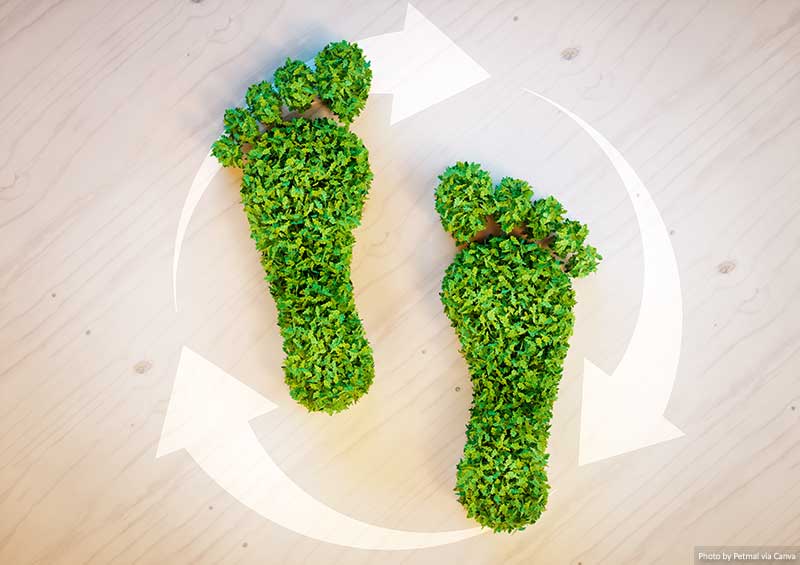

Be it India or abroad, it is not difficult to find people who love to travel more
than anything else. We’ve all had “Travel the world” on our bucket lists, and I
know you do try to knock it off the list one city at a time whenever you get the
chance. Traveling can be adventurous, therapeutic, life-changing, and so on,
but can it be sustainable?
Hence when on a quest to travel the world, you should also be conscious of the
impact of your travel on the environment.
Travel was the worst-hit industry during covid, and after nearly two years it is
witnessing a steady comeback. Tourists are back with a vengeance ( After
spending the majority of the past 2 years at home ) this peak-travel season.
With this tremendous increase in travel comes an enormous environmental
and social cost. And as post-pandemic, people have started to become more
conscious about their choices and impact on the planet, why not take your
sustainable habits to the next step by being a sustainable traveller?
What does it mean to be a sustainable traveller?
Being a sustainable traveller involves minimizing your environmental impact
while also promoting ethical economic growth in tourism-affected areas. That
includes everything from reducing plastic use and choosing more
environmentally friendly transportation to eating at locally owned eateries and
reserving eco-friendly lodging.
Sustainable travel aims to satisfy the travel industry's demands while
preserving natural and cultural surroundings. Tourism, if not handled
effectively, may have devastating consequences, ranging from the loss of a
destination's cultural identity to the depletion of natural resources, pollution,
and environmental damage. Tourism may be a beneficial tool for supporting
communities and giving back to nature in many circumstances.
Here are 10 tips to be a sustainable traveller:
Make better travel choices
Air travel emissions make up a whopping 20% of a tourist’s carbon
footprint. If you must fly, be sure to pack light to lessen the plane’s load
and try to book a non-stop flight. On average, non-stop flights reduce
carbon emissions by 100 kg per person compared to connecting options.
- Various airlines are also working towards offering more sustainable forms of travel.
- Bookdifferent.com, for one, calculates your carbon footprint every night depending on your choices and provides eco-friendly evaluations.
- While the business and first-class seats are more comfortable, they also take up substantially more room per person, resulting in a significantly higher carbon footprint. It is preferable to fly economy if you wish to reduce your carbon footprint.
Pack wisely
After you've booked your flights, the next step in decreasing your carbon
footprint and making your life easier while travelling is to pack carefully.
What you bring with you on your trip might help you lessen your impact
on the environment even further.
PACK LIGHTLY, Take all kinds of necessary items that mix and pair nicely
with one another and may be layered when packing clothing. This will
not only make your life simpler, but it will also help lower your total
carbon footprint because your luggage will be lighter and easier to move, whether you're flying, taking the train, driving, or taking the boat.


Support the local economy
Despite a large amount of money spent on tourism, the majority of the
money (up to 90%) leaves the actual tourist destination. Instead, they
return to the huge international corporate tourism enterprises.
Given the tremendous influence tourism can have on a local place, this is
a disheartening figure.
The greatest approach to learn about a new culture is to seek out local
experiences such as homestays and hiring local guides. This way, your
money will go directly toward strengthening the local economy.
Eat locally
Since food accounts for nearly a quarter of all planet-warming
greenhouse gases generated each year, thinking about what you eat
when travelling is crucial if you want to leave a lower carbon footprint.
Let's face it, there's nothing quite like eating local food. Not only is the
cuisine delicious, but it also benefits the local economy by using local
ingredients and vegetables, as well as employing local workers,
restaurant owners, and promoting food culture.
So, when you're visiting a new region, make a point of eating from
locally-owned restaurants, street food vendors, and markets, rather
than sticking to what you're used to. Not only is it tastier this way, but
you're also supporting local communities in their self-sufficiency
Stay at a greener hotel
When reserving your hotel or resort, it's worth spending a little
additional time looking for hotels and resorts that are more eco-friendly.
Support families by staying in locally-owned guesthouses instead of large
energy-intensive hotels.
Staying in a low-impact hotel can also help you lessen your
environmental effect. This might be a more basic, smaller hotel or a
higher-end facility that uses renewable energy and water/energy-saving
technologies.
Respect locals
One of the most fascinating aspects of travel is the opportunity to learn
about different cultures, beliefs, and ways of life. Take advantage of this
opportunity to broaden your views by accepting differences and
engaging yourself in the local culture.
Before travelling, begin immersing yourself in various cultures by
learning about the history, traditions, and etiquette of the area. Learn a
few phrases in the local language by downloading a language app. Be
aware that in certain places, certain gestures, attire, or phrases are
deemed insulting. When visiting religious or spiritual locations, be
extremely cautious. Only visit tourist-friendly locations and follow all
safety precautions. At certain places, this may entail removing your
shoes, covering your shoulders, speaking quietly, or refraining from
taking photographs.
Switch to reusables
Humans consume a million plastic bottles each minute on a global scale.
Allow it to soak in for a moment.
Hence, when you consider that plastic takes 400 years to biodegrade
and that drinking water is free in many nations, the thought of using a
plastic bottle for convenience becomes ludicrous. To prevent buying
needless single-use bottles, fill up a reusable water bottle and carry it
with you wherever you go.
Biodegradable shampoos and laundry detergent, as well as sunscreen
with fewer chemicals, can help you leave less of an environmental
footprint while carrying your own water bottle, bamboo toothbrush,
reusable straws and even cutlery can help you cut down on your usage
of single-use products.
Stay longer
Tourism transportation demands have an impact on energy usage and
CO2 emissions, as well as infrastructure and land use. Visitors who
remain for shorter periods of time are more likely to visit fewer small
businesses outside of major tourist destinations, whereas tourists who
stay longer are more likely to visit more small businesses outside of
major tourist areas. Rather than planning trips in which you try to see as
many locations or see as much as possible in a short amount of time,
consider remaining in one place for longer and gaining a proper feel of
the area.
- Take a cooking lesson to learn how to create traditional foods and to sample the local flavors.
- Spend a day wandering or riding about town, and you'll undoubtedly come across hidden gems such as a quaint neighborhood coffeehouse.
- Take a stroll around a museum and arm yourself with a plethora of interesting knowledge.
- Travel experiences that are more real, memorable, and meaningful are enhanced by spending longer time in a place. At the same time, it relieves stress on the towns and communities you visit, while also benefiting the local companies you support.
Be mindful of local resources
Tourism consumes energy for heating, lighting, and electricity in addition
to transportation. This, combined with tourists' heavy usage of water,
might place a strain on local water supply and energy infrastructure.
Tourists consume substantially more water and energy than locals, and
many places are unable to meet the demand. As global temperatures
increase and the population rises, the situation will become considerably
worse.
- When you're on vacation, try to save local water and energy resources as much as possible.
- Turn off the lights, when not in use,, TV, and any other equipment.
- When you leave your hotel, switch off the air conditioning or raise the thermostat a few degrees. Instead of taking a bath, take a shower and make it as brief as possible.
- To avoid unnecessary laundry, hand wash your belongings and hang up the "Do Not Disturb" sign.
Walk as much as possible
A majority of tourism's environmental impact may be linked to
transportation, which includes more than simply airplanes. The airport
vehicle rental counter is frequently a tourist's first visit after arriving at a
new place, so they can travel to their accommodation or go
sightseeing.
Being a sustainable traveller, you should try to take
advantage of every chance to walk, cycle, or take public transportation
to avoid vehicle-related emissions. Check to see whether your location
offers a bike-sharing program or an easy-to-navigate train system; you
may be able to save money while doing so.
Buying handcrafted souvenirs and art made by indigenous craftsmen
may help conserve real cultural heritage while also providing
employment opportunities. Locally grown food and enterprises owned
and maintained by local families are frequently of higher quality and
more cost-effective, helping to retain money in local households.


Final thoughts
In this day and age, we are really fortunate to be able to explore the world so
readily and widely. It is, without a doubt, one of life's greatest pleasures and
experiences. And we should cherish and protect the incredible places we visit,
be climbing a mountain or relaxing at a beach, instead of exploiting them.
We hope you remember the negative impact travelling can have on the
environment and become more conscious about your travel plans in the
future.
Think before you travel!
Hi Better Earthlings, Got any sustainable stories to share?
Write to us: aradhya@thebetterearthlings.com






